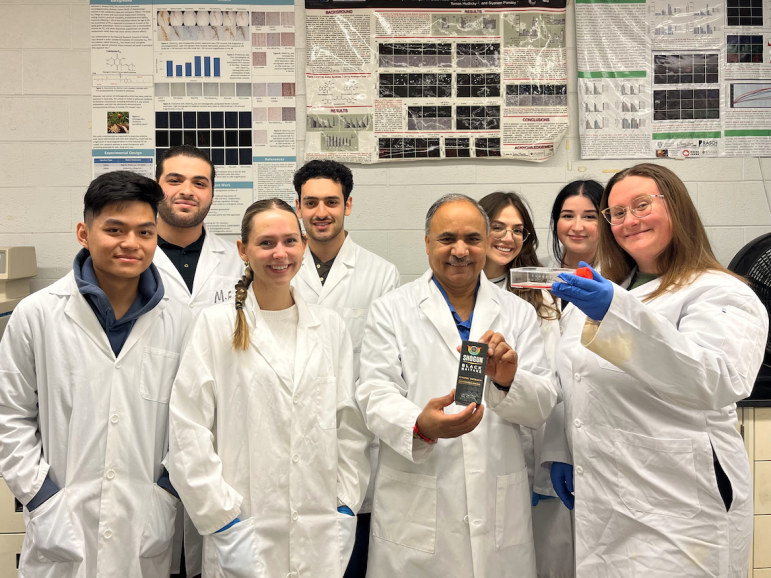
Cancer researcher Siyiram Pandey and his students at the University of Windsor with a box of maitake mushroom extract. His lab is studying the anti-cancer effects of the extract with a new $60,000 grant.
By Jack Armstrong
Hundreds of years ago a lord of the Tohoku region in Japan offered villagers a deal – equal weight in silver to any who could find a rare mushroom.
The villagers danced with joy when they found the valuable fungus, inspiring the mushroom’s name, “maitake,” or “the dancing mushroom.”
That’s the story told by Shogun Maitake, a Canadian company partnering with University of Windsor researchers to investigate if the black maitake mushroom could help treat cancer or ease negative reactions to chemotherapy.
“It is really promising,” said Siyiram Pandey, the team’s research lead and a chemistry professor at the University of Windsor. “It is not only killing a specific cancer, it seems to be active on many cancers.”
The team is running tests with maitake extract, a dark, odorless liquid provided by Shogun Maitake, which sells maitake mushrooms.
In early trials, the extract killed 70% of cancer cells, Pandey said. That’s 10% more effective than taxol and cisplatin, two of the most popular chemotherapy drugs. And it has fewer extreme side effects, he said.
”It is a bit better than chemotherapy in terms of our results,” he said. That’s because the extract has fewer side effects than other treatments.
The team recently received a two-year, $60,000 grant from Mitacs, a Canadian nonprofit research organization, to investigate the mushroom’s effect on cancer cells and chemotherapy. If the lab’s findings are confirmed, cancer patients could one day take an oral maitake supplement to fight the disease.
The results are preliminary, but natural treatments do have a basis in science. There’s a long history of drugs coming from nature, said Kathy Borden, a professor at the University of Montreal and a researcher at the Institute for Research in Immunology and Cancer.
“There are examples of very successful natural products or things that started as a natural product and became modified in order to become the drug they are,” she said.
For example, rapamycin, a drug used to help lower the chances that a patient will reject a transplanted organ, has natural origins. The antibiotic bacteria was discovered in soil on Easter Island. It’s also being used in cancer treatment.
Still, the road to proving if maitake mushroom can fight cancer is long and paved with more research and more funding.
“Maybe they found something very cool and useful and maybe not,” Borden said. “It’s just going to be the time that tells.”
To test the fungus’ effectiveness, the research team grows a variety of cancer cells in petri dishes, including lung cancer, colon cancer, and melanoma. They treat these cells with extract from the maitake mushroom and wait to see if the substance triggers a process called apoptosis.
That process refers to the cells killing themselves. This is a fairly common way we fight cancer, Borden said.
Pandey said it’s also “a very good way of killing cancer cells without causing any trouble,” since it avoids killing healthy cells, unlike chemotherapy. He said the extract is well-tolerated by healthy cells and can selectively kill cancer cells.
The researchers also combine the extract with chemo to see if they work well together. So far it seems they do, Pandey said.
Aside from its cancer-fighting abilities, the maitake mushroom could also help patients cope with chemo. Pandey said the maitake interacts positively with chemotherapy and actually accelerates the treatment.
Chemo can also weaken the immune system, making patients vulnerable to attacks and infections. Research from the Sloan-Kettering Cancer Center showed extract from the maitake modified the immune system when given to cancer patients.
However, the research noted the mushroom’s effects were complicated, and it may enhance as well as diminish immune function. Pandey said he hopes to test the use of maitake alongside chemo, and one day it may be tested as a sole treatment for cancer patients.
Researchers aim to begin animal trials by next year.
But the mushrooms are already commercialized and marketed as immunity enhancing supplements. Shogun Maitake sells fresh mushrooms in Costco, Farm Boy and even in five-star hotels. But its presence in the North American market is fairly new – the Shogun Maitake website advertises the fungus as “a tradition crafted in the heart of Japan, now shared with North America.”
Supplements are increasing in popularity as more and more people begin to believe in natural treatment methods, said John Jacobs, the marketing director at Shogun Maitake.
“We want to tell to the world, maitakes have very unique properties…people don’t know about the importance of the maitake,” he said.